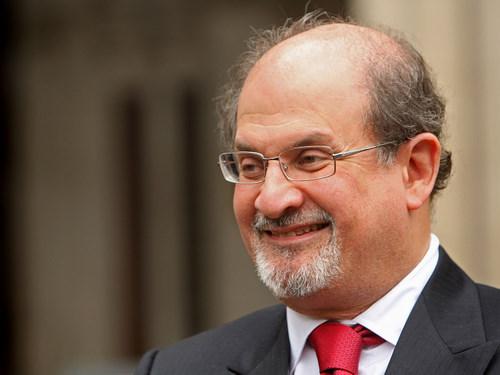CasteNCreed: Rushdie speech free but irrelevant
Salman Rushdie’s “Satanic Verses” is banned in India because the novel allegedly insults the prophet Muhammad, and the author himself was prevented from visiting India earlier this year. So why was nobody offended this weekend?
After a lot of hot air about free speech, Salman Rushdie finally made it to India, and nobody was offended. All he had to do was wait for the state elections to be over, and for the Congress Party's (failed) policy of Muslim appeasement to fall by the wayside. And then he could feel free to entertain everyone (except Pakistan's Imran Khan, Congress scion Rahul Gandhi and Kashmir chief minister Omar Abdullah).
"Listening to his words did not cause the audience to spontaneously combust," the staff edit in the Indian Express explained. "He delivered his familiar use-it-or-lose-it speech on freedom, denounced votebank politics and religious bigotry, insulted a few politicians, estimated how many Muslims really cared about his presence. The lack of drama and special effects around his talk only showed up how empty all the fuss in Jaipur was."
So true, and yet…
There is an important argument to be made about freedom of speech in India. It's just that the English-speaking elite aren't that attuned to it. Instead of Rushdie's dogged (and, frankly, surprisingly patient) explanations of why he believes he should be allowed to offend Muslims, consider Arundhati Roy's explanation of what's really happening to free expression here in India.
It's for sale.
"Essar was the principal sponsor of the Tehelka Newsweek Think Fest that promised “high-octane debates” by the foremost thinkers from around the world, which included major writers, activists and even the architect Frank Gehry," Roy writes in this week's Outlook. (All this in Goa while activists and journalists were uncovering massive illegal mining scandals that involved Essar.)"
"Tata Steel and Rio Tinto (which has a sordid track record of its own) were among the chief sponsors of the Jaipur Literary Festival (Latin name: Darshan Singh Construction Jaipur Literary Festival) that is advertised by the cognoscenti as ‘The Greatest Literary Show on Earth’. Counselage, the Tatas’ “strategic brand manager”, sponsored the festival’s press tent.
While everybody declaimed about the travesty of Rushdie being prevented from speaking by a mob of (most likely paid) fundamentalists, another sort of payoff was going on, Roy points out. " In every TV frame and newspaper photograph, the logo of Tata Steel (and its tagline—Values Stronger than Steel) loomed behind them, a benign, benevolent host."
It should come as no surprise, therefore, that there were "hardly any reports about the festival sponsors’ role in the war in the forests, the bodies piling up, the prisons filling up," Roy says. "Or about the mandatory public hearing for the Tata Steel plant in Lohandiguda which local people complained actually took place hundreds of miles away in Jagdalpur, in the collector’s office compound, with a hired audience of fifty people, under armed guard. Where was Free Speech then?"
(Yeah, I know I promised you only 800 words earlier. I cheated.)
The story you just read is accessible and free to all because thousands of listeners and readers contribute to our nonprofit newsroom. We go deep to bring you the human-centered international reporting that you know you can trust. To do this work and to do it well, we rely on the support of our listeners. If you appreciated our coverage this year, if there was a story that made you pause or a song that moved you, would you consider making a gift to sustain our work through 2024 and beyond?
